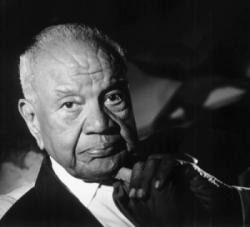
The Rev. Dr. Gardner C. Taylor, 96, who was named Vanderbilt Divinity School Distinguished Alumnus in 2000, died on April 5 in Durham, North Carolina. He had earned his bachelor’s degree from the Oberlin School of Theology in 1940.
Taylor, a prominent leader in the U.S. Civil Rights Movement, worked with the Rev. Martin Luther King Jr. and other African American clergy to found the Progressive National Baptist Convention. He served as the convention’s president from 1967 to 1969.
“A great light has dimmed, so we must now trim our own lamps all the more,” said Emilie M. Townes, dean of Vanderbilt Divinity School and the E. Rhodes and Leona B. Carpenter Professor of Womanist Ethics and Society. “Taylor was not only a powerful preacher, he was a compassionate pastor who modeled how to blend head and heart in the work for justice.”
“Dr. Taylor was a preacher par excellence and a great teacher,” said Lewis V. Baldwin, professor of religious studies, emeritus. While Baldwin was pursuing graduate degrees at Colgate Rochester/Bexley Hall/Crozer Theological Seminary, Taylor was a visiting professor of homiletics there. “I attended his Black Preaching class sometimes, and often accompanied my late roommate, Roy C. Young, to pick him up at the airport when he flew into Rochester for that course,” Baldwin said. “[rquote]His legacy as a pulpiteer is unmatched and, in my judgment, will never be surpassed.[/rquote] He actually set the standard for prophetic preaching, and had a great influence on Martin Luther King Jr. and so many other preachers who figured prominently in the civil rights movement of the 1950s and ’60s.”
Taylor was born in Baton Rouge, Louisiana, and his father, a Baptist preacher, died when Taylor was 13. Raised by his mother and an aunt, Taylor received his bachelor’s degree from historically black Leland College.
He had aspired to be an attorney but changed his mind after being involved in a terrible car accident on an isolated Louisiana road. Taylor tried to avoid hitting a car that swerved into his path, but the collision resulted in the deaths of the two white men in the other vehicle. The only witness to the accident spoke truthfully about what had happened. Taylor reassessed his life and enrolled at Oberlin College, where he earned his degree from the Oberlin School of Theology (which moved to Vanderbilt in 1966).
Taylor was called to Beulah Baptist Church in New Orleans before returning to his father’s former church, Mount Zion Baptist in Baton Rouge. After accepting an invitation to preach the sermon for the centennial celebration at Concord Baptist Church of Christ in Brooklyn, New York, he became the congregation’s senior pastor. Membership nearly tripled during his 42 years at Concord Baptist, located in the Bedford-Stuyvesant neighborhood. His accomplishments included establishing a $1 million endowment for community improvement grants to central Brooklyn neighborhoods.
“America shall perhaps never again see a powerful Christian personality, preacher, pastor, prophet, the holy brilliance of the likes of Gardener C. Taylor,” said Forrest Harris, director of the Kelly Miller Smith Institute on Black Church Studies and associate professor of the practice of ministry. Harris remembers when Taylor received the Divinity School Distinguished Alumnus Award in September 2000. Taylor also delivered the keynote address at the Divinity School’s fall convocation in Benton Chapel.
“Reverend Taylor was chosen from a large number of outstanding alumni/ae for his exceptionally courageous ministry as preacher, teacher, pastor and prophet to the church and society,” James L. Smalley, BD’67, then- president of the alumni/ae association, said at the time.
Time magazine named him the dean of black preachers in 1980. In 2000, he was awarded the Presidential Medal of Freedom from President Bill Clinton. His books include Faith in the Fire: Wisdom for Life (2011).
Taylor had lived at the Hillcrest Convalescent Center in Durham since 2011. He is survived by his wife, Phillis Taylor, and a daughter and step-grandson.